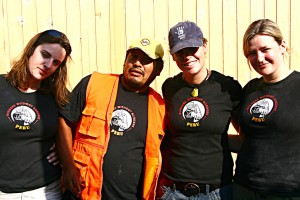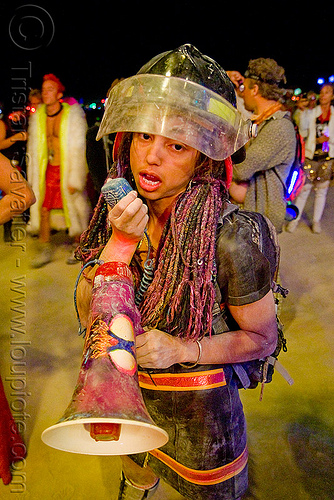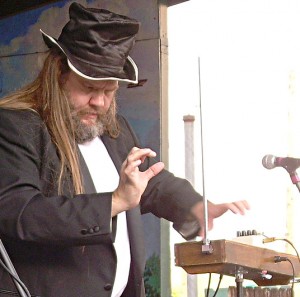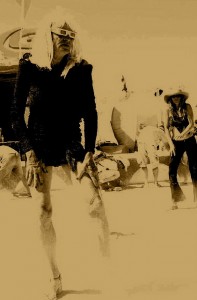On A Mission, The playa is noisy, fiery, sexy, chaotic. Normally it’s almost impossible to go in a straight route from point A to point B at…
A Burner Lexicon: On A Mission
Posted in A Burner Lexicon, and Burning Man
Adventures of a Gonzo Journalist
Posted in A Burner Lexicon, and Burning Man
On A Mission, The playa is noisy, fiery, sexy, chaotic. Normally it’s almost impossible to go in a straight route from point A to point B at…

Civic Responsibility, –noun, According to Scribe’s book Tribes of Burning Man, Larry Harvey (also known as the Hat) resists attempts to define Burning Man as a countercultural movement. Rather, he sees the festival as a generator of culture in its own right. Practicing the principle of Civic Responsibility is one of the ways in which our culture sets itself as parallel to the default world rather than in opposition to it.
Participants take great pride in contributing to their temporary community. Even the smallest theme camps try to offer something to others or volunteer in some way to better their events. Unlike many underground festivals or raves, Burns obtain all necessary permits and work to form good relationships with local law enforcement and the communities where they take place.
Civic Responsibility does not end at the edge of the playa. When Hurricane Katrina devastated New Orleans during Burning Man in 2005, a team of experienced Burners took their equipment and skills to the area to assist with recovery efforts. This led directly to Burners Without Borders, which leverages Burners’ ability to thrive in extreme environments as way to aid disaster relief. This effort is just one of many — Burners all over the world work together to beautify, improve, and generally make reality camp more creative, pleasurable and fun.
In 2008, Austin area Burners effectively took over the city’s First Night celebrations, filling the streets with art and performance, and culminating in the burning of a gigantic clock tower. With over a hundred thousand in attendance, this became the largest ever Burning Man-style effigy ritual, and a great example of civic responsibility.
The Lexicographer has been soliciting the opinion of other thoughtful Burners on the Ten Principles. Below you will find another opinion, but more are still welcomed. Use the contact information at the top to send your thoughts.
Other entries in A Burner Lexicon can be found at https://kitoconnell.com/lexicon/
Posted in A Burner Lexicon, Burning Man, and Guest Bloggers

Radical Self-Expression, –noun, In the psychedelic atmosphere of the playa, it becomes easier to speak freely, even bluntly. Direct communication is greatly valued both for its honesty and for its clarity in the chaotic atmosphere of a Burn event. Radical Self-expression is our art, whether in the form of a performance, a sculpture, or just a deep conversation.
Burning Man’s official description of this principle encourages responsible communication, urging one to consider speech a gift and therefore to “respect the rights and liberties of the recipient.” However, when the post-apocalyptic punk and free-love hippie aspects of the culture collide it often happens via some especially radical form of self-expression (Brian Doherty observed this clash in his book This Is Burning Man).
Radical Self-expression is used to justify rock operas, rave camps blasting music at all hours, a wildly creative fashion aesthetic, mutant vehicles equipped with flame throwers and loud arguments over bull horns at 4am. Over the years this has made Burner culture home to confrontational groups like the riot-gear wearing Chupacabra Policia while simultaneously welcoming loving groups like the hippie massage gurus of HeeBeeGeeBee Healers and exuberant expressions of human sexuality like Comfort & Joy (many of whom were formerly known as the queer camp Jiffy Lube).
The limits of this self-expression, especially where it may come into conflict with the other nine Burner principles, is an ongoing source of debate.
The lexicographer attended a tiny regional event where some participants decided that they’d create “Middle of the Road Camp” as their personal form of expression. The community tolerated this offense against civic responsibility for the duration of the weekend before making it clear that such things should never happen again.
The Lexicographer has been soliciting the opinion of other thoughtful Burners on the Ten Principles. Below you will find other opinions, but more are still welcomed. Use the contact information at the top to submit your thoughts.
Other entries in A Burner Lexicon can be found at https://kitoconnell.com/lexicon/
Posted in A Burner Lexicon, Burning Man, and Guest Bloggers

Leave No Trace, –noun, One of the most highly publicized aspects of the culture is Leave No Trace, often abbreviated as LNT. This principle is followed by even the smallest group wishing to be associated with the Burn. While regional events other than That Thing In The Desert may adopt their own alternative versions of the Burner Principles, this one is still universally practiced. It is not just good for the environment in an abstract way, but is also one of the main reasons that Burners are allowed to return again and again to the same public or private sites to hold their festivals and parties.
Many hours, days or even weeks of volunteer time are spent cleaning sites of trash and debris to return them to as pristine a condition as possible. This is done first by participants and members of theme camps, who may be penalized if their site is left in bad enough condition. Then, at Burning Man, the Department of Public Works takes over. These hard-working volunteers have even developed new techniques to face issues unique to playa cleanup, such as busting open the dunes that may form around discarded tents.
Of course, an event with as many generators, shade structures, outfits, and swag as the average Burn is going to produce waste and leave its mark on the environment, even before considering the supplies the community must bring in for basic survival. This principle is a goal to strive for and is meant to (and does) provoke debate about the best, least damaging way of doing our events.
The lexicographer has seen Leave No Trace cause conflicts between Burners and other subcultures. For example, many rennies have expressed frustration at criticism from Burners, because the trash at some renaissance faire encampments is actually cleaned up by paid employees.
The Lexicographer has been soliciting the opinion of other thoughtful Burners on the Ten Principles. Below you will find another opinion, but more are still welcomed. Use the contact information at the top to submit your thoughts.
Other entries in A BURNER LEXICON can be found at https://kitoconnell.com/lexicon/
Posted in A Burner Lexicon, Burning Man, and Guest Bloggers
Nobodobodon, or “Nobody” for short, is one of the Texas Burn community’s most opinionated members. After a lot of discussion, debate, and contemplation he created an alternate form of Burning Man’s Ten Principles. Below you will find Nobody’s 7 Burner Principles, sometimes called the “6.5 Principles” because the first one leads directly into the remaining six.

Genuine Self-Expression — Our events are intended to foster an environment in which we are free to express our true, inner selves, instead of what is expected or imposed by outside factors. We express ourselves through art, music, volunteerism, gift-giving, and in honest social interactions. We foster this open and honest self-expression at our events in a number of ways:
Participant-created Events — Our events are not created by organizers presenting paid performers to paying spectators. Our events are created by all attendees, and all attendees are expected to contribute something to the creation of the event, whether that’s volunteerism, art, performance, gifting, even organization, or all of the above.
Non-objectification — Genuine interactions between people occur when we treat each other as people. We will not reduce ourselves, our gifts, or our expression to commodities to be bought and sold for money, for social status, or for a “notch on the bedpost.” Gifts are given freely, with no expectation of compensation or other gifts in exchange.
Self-reliance — Self-reliance is crucial to self-expression. The more of your basic needs that are met by others, the more you cede to them your authority to choose how you express yourself. The organizers of the event provide the minimum services and structure to keep the event legal and sustainable, and to promote these values. Everything else must be provided by participants.
Civic Responsibility — Civic Responsibility ensures that other participants are able to express themselves. All participants strive to find a balance so their self-expression doesn’t interfere with the self-expression of any other participants. Additionally, participants seek to help keep events sustainable by volunteering, cleaning up after themselves, and assuming personal responsibility for conducting themselves in accordance with local, state and federal laws.
Inclusion –– We seek to express ourselves honestly to all other participants regardless of differences in their background, experiences, and tastes. The only prerequisite for participation in any of our events is an honest effort to abide by our principles and guidelines. This is not just a gate policy, it’s a mindset by which we foster one another’s self-expression.
Immediacy –– The most genuine interactions between individuals occur when both parties are present in the moment, focusing on what is occurring as it unfolds. Much of the art at our events is not intended to outlast the duration of the event. Recording the sights and sounds of the event is less important than living the experience firsthand.
Eventually Nobody refined these principles even further, realizing that the essence of many of them could be combined. This led to the Three Principles currently used by Burning Flipside, the largest Texas regional event.
I recently asked him for more thoughts on Burner Principles and Burning Man community philosophy. You’ll find what he had to say below.
This is part of A Burner Lexicon’s ongoing series on the Ten Principles of Burning Man. Got an opinion on one or all? Get in touch with the lexicographer by using the comments or the contact information at the top of this page.
Other entries in A Burner Lexicon can be found at https://kitoconnell.com/lexicon/
Posted in A Burner Lexicon, Burning Man, and Guest Bloggers

Radical Inclusion, –noun, Radical Inclusion is the idea that everyone is welcome at That Thing In the Desert and other events which follow the Ten Principles of Burning Man. Though many have commented on the predominantly Caucasian make-up of the Black Rock City population, citizenship is open to all.
This is not limited to just the usual race, creed, color or sexual orientation. Many find a home at Burn events who feel themselves outcasts in the default world for countless reasons. Even more so, participants feel free to remove the masks they wear in polite society and share their freakiest, most delightfully deviant selves.
But what are the limits of radical inclusion? Some extreme behaviors, like theft and assault, must be held unacceptable in any healthy community. And just because an event is attended by Burners does not mean it will allow everyone — this is especially true of parties in private homes. This is not discrimination, but the natural formation of social groups and friend circles. However, this principle still serves to discourage cliquish behavior and encourage the introduction of new blood to older groups.
Like all of the Burner Principles, radical inclusion functions poorly in isolation and works best when used in conjunction with the other nine and a healthy dose of common sense.
The Lexicographer has been soliciting the opinion of other thoughtful Burners on the Ten Principles. Below you will find the opinions of several, but more are still welcomed. Use the contact information at the top to submit your thoughts.
Other entries in A Burner Lexicon can be found at https://kitoconnell.com/lexicon/